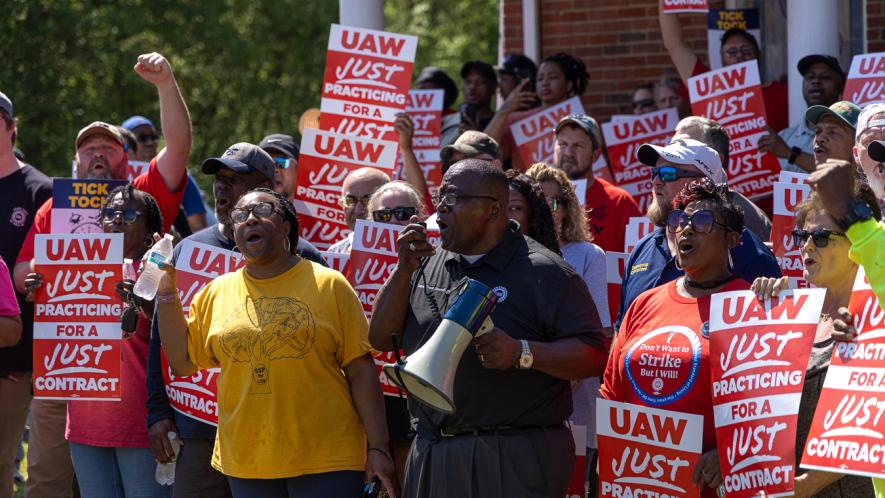US: Labour Leaders Pledge to Keep up Fight After Trump’s Win

Photo via UAW/X
As President-elect Donald Trump and the forces of the ultra-right within the Republican Party begin to assemble an administration beholden to the interests of the billionaire class, organized labor in the United States remains determined to put up a fight.
When Trump took office for the first time in 2016, the National Labor Relations Board (NLRB) took a major step backwards from the advances achieved under Obama and rolled back workers’ rights to organize unions and collectively bargain for better conditions. Trump’s new administration will likely bring more of the same, as experts predict that Trump will remove Biden’s National Labor Relations Board General Counsel Jennifer Abruzzo, who is viewed as pro-union, as well as reverse decisions that make it harder for companies to fight union organizing.
The ultra-right agenda to eliminate the right to organize
The possible attacks that the Trump administration may bring against organized labor has leaders on high alert. According to Richard Hooker, Secretary Treasurer & Principal Officer of Teamsters Local 623 in Philadelphia, Trump “made it almost impossible to organize,” building an NLRB that “will always side with the company and not the workers.”
Leaders like Hooker are worried about the right-wing plan for unions, especially underlined in Project 2025. Although Trump has publicly disavowed the Heritage Foundation’s 900-page right-wing masterplan, the way he is assembling his new administration suggests that many proposals in the Project 2025 document may gain traction. The policies outlined in the so-called “presidential transition project” are alarming for workers: eliminating public sector unions, enabling states to ignore worker protections such as child labor laws, banning majority sign-up as a way for workers to organize into unions, and rescinding guarantees for mandatory overtime pay.
“Now when you have Elon Musk, the ultimate anti-union person, next to Trump, you know it’s going to spell doom for workers,” Hooker told Peoples Dispatch.
According to the authors of Project 2025, gutting worker protections and making it far more difficult for workers to organize would “help expand workers’ freedom.”
Peoples Dispatch spoke to Jermaine Evans, who organizes fellow workers in the gig economy with the Union of Southern Service Workers (USSW) in South Carolina, a so-called “right-to-work” state. According to pro-corporate forces, the gig economy gives workers the complete freedom to work whenever and however they want—the ultimate luxuries of flexibility and autonomy. And champions of “right-to-work” laws claim that they prohibit workers from being forced to join unions.
“Right-to-work” laws favor employers by making it difficult to organize and sustain unions—resulting in overall lower wages and benefits for workers. Evans says that many workers have been led to believe that being in a “right-to-work” state means that “everybody has a right to work.” But in reality, according to Evans, what these laws really mean is that workers who have difficulty organizing themselves into unions are more vulnerable to employers who can “fire you for whatever reason they want.”
“You got a right to work, and they got a right to fire you,” he said.
And the gig economy is far from a glamorous exercise in autonomy, as Evans outlines, most of his fellow workers are “literally just surviving, working two or three jobs, and in some cases still have to stay in a hotel” because they cannot afford proper housing. According to data from 2020, 29% of gig workers work below their state’s minimum wage, as compared to 1% of W-2 service-sector workers.
Organizing under the conditions that Evans is working with can seem impossible, and with an incoming Trump administration, the task seems more daunting than ever. Especially as Project 2025 seems to portend the “right-to-work” style of labor policy spreading nationally, not simply in a handful of states run by conservative lawmakers. However, Evans and USSW have vowed to continue their fight and building worker power.
Trump administration promises further attacks on workers in education
For workers in education, Trump’s incoming administration poses a unique set of challenges. Trump has proposed shutting down the federal Department of Education, also in line with the Project 2025 plan. He has promised to target and defund schools which teach so-called “critical race theory” or “gender indoctrination.”
Nathalie Hrizi, Vice President of Substitutes at the United Educators of San Francisco and a longtime public school teacher, expressed concerns around Trump’s promises to defund public education.
“Critical race theory has become a boogieman,” according to Hrizi. “It is of course something that exists primarily in academic institutions. The boogieman is a cover for an attack on a real, critical, equity based education, to tell the truth about our history, the truth about our experiences, that reflects our students’ lives and our families’ experiences.”
In an interview on Fox and Friends, Trump responded to concerns that without a Department of Education, “liberal cities” will teach students that the US was “built off the backs of slaves on stolen land, and that curriculum comes in.” Trump responded by saying, “Then we don’t send them money.”
San Francisco has an ethnic studies requirement for high schoolers, a hard-fought gain of social movements, which Hrizi’s son is currently completing. “There’s a real contradiction between the really racist fearmongering talk that’s whipping people up, and the reality. And the reality is that this kind of education is a well-rounded quality education that provides for all of our students, provides critical thinking skills, provides an accurate understanding of history and the current experience, and allows for solidarity to be built over great divisions in our student populations and our educators populations.”
Peoples Dispatch spoke to Grant Miner, the acting president of United Auto Workers Local 2710, which represents student workers at Columbia. Local 2710 workers are particularly worried that Trump’s administration could reverse a 2016 NLRB ruling that upheld the right of graduate workers at private universities to unionize, which was hard fought by workers at Columbia in particular.
Miner also has another set of concerns, especially regarding the student movement for Palestine, which reached new heights in the spring of 2024 when Columbia students launched a “Gaza Solidarity Encampment,” taking the global Palestine solidarity movement by storm. Members of Local 2710, including Miner himself, were involved in this movement, for which they have faced disciplinary action by the university. But thanks to the protections afforded by their union, these Columbia students are able to argue that their protest actions are “part and parcel of our collective action, what you would call a concerted action legally,” Miner says.
“We also have another more basic case, because a lot of our members, including myself, were brought before the university for inquiries and punishments, but were denied union representation,” Miner describes. These cases are set to be brought before the NLRB, but this poses a challenge for the union following Trump’s election.
According to Miner, the local is now “faced with the difficult decision” of possibly pulling these complaints.
“Because if they go up in front of the board, and it’s a bunch of conservative board agents, then for all we know, they could just say that actually no, there’s no such thing as concerted activity for Palestine,” Miner articulates. “And that sets a legal precedent which could be quite damaging to organizing around the country.”
Miner also commented on Trump’s pick of New York Representative Elise Stefanik as UN Ambassador, who he called a “hardcore partisan for Zionist attacks on students.” Stefanik went viral for her role in orchestrating the downfall of several prominent university presidents, including former Harvard President Claudine Gay, and former Columbia President Minouche Shafik, over the accusation that these presidents were not repressing pro-Palestine students enough.
“It signals a broader trend in this presidency towards even more heavy policing of protest activity on campus,” Miner said.
Sophie Coppieters’t Wallant, President of the MIT Graduate Student Union, Local 256 of the United Electrical Workers, is particularly concerned about what Trump’s promise to deport between 15 to 20 million people means for international graduate workers in her union. Wallant, like Miner, also worries about Trump’s persecution of protest activity on college campuses, as MIT students also staged their own Gaza Solidarity Encampment and have taken many actions in solidarity with Palestine.
“We’ve seen from MIT, but also university administrations across the country, a really serious crackdown on free speech and freedom to protest, especially around the issue of Palestine,” Wallant told Peoples Dispatch. “We have these really draconian protest policies that have been put into effect on many campuses, including our own. The feeling is that that will continue under a Trump presidency and potentially ramp up.”
Labor remains determined to fight
“I was on a call with about 100 educators from across the state of California who are all involved in different unions,” Hrizi told Peoples Dispatch. “The spirit, I would say, is a fighting spirit.”
“As unionists, as public educators, who will face some measure of attacks from the coming Trump administration, the only way to overcome that is to organize.”
Miner and Wallant echoed this sentiment. “I think a lot of people are feeling discouraged about the Trump presidency. That’s all very valid,” Miner said. “One thing that is important to remember is that labor has always had to struggle to find its place in this country.”
“Just because we face increased opposition from a very hostile presidency doesn’t mean that we have lost yet. The NLRB affords us a number of important legal rights, but it also in some sense controls the things that unions are allowed to do. But we shouldn’t ever forget that the actual source of our rights as workers is the ability to withhold our labor and to exert labor power over the bosses,” Miner articulated.
“That hasn’t gone away. Just because we might lose some protections, that doesn’t mean that we’ve lost all of our power. We don’t get power from the government. We get power from solidarity with one another.”
“Our task, at least in the short term, is to build out our organization, to build even stronger connections and a network across all of our coworkers. So that when these attacks do come, we’re already connected with one another. We’re organized and we’re ready to fight back,” Wallant said. “One concrete thing that we’re doing is to really make sure we’re focusing on growing our network amongst our international coworkers,” as Trump carries out his mass deportation plan. The union plans to “reach as many international workers as possible, and to make sure they’re in contact with stewards and that they know their rights under the contract.”
Evans emphasized the importance of internal organizing within union membership, especially regarding political education. “The hope is that more folks will start seeing the importance of organized labor,” Evans said. “Some people might not realize how politics affects our work environment. Because if not, we’ll be prepared to drink any Koolaid that they pour in our cup.”
Above all, labor leaders emphasize the importance of uniting with organized workers across sectors. “Teamsters, SEIU, AFL-CIO, UAW, the culinary unions, the private sector unions, the public sector unions. We’re going to have to organize and unite like never before,” Richard Hooker said. “We’re really going to have to have a weaponized solidarity, I call it. We’re going to have to not just talk about solidarity, we’re going to have to weaponize it, to the point where when Trump makes these decisions, he knows that we’re coming to fight back. It’s not just going to be the Teamsters, it’s not just going to be SEIU. It’s going to be every single labor organization in the United States.”
Get the latest reports & analysis with people's perspective on Protests, movements & deep analytical videos, discussions of the current affairs in your Telegram app. Subscribe to NewsClick's Telegram channel & get Real-Time updates on stories, as they get published on our website.























